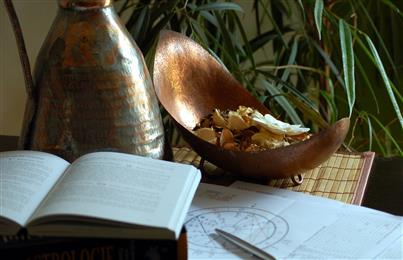
The Origins of Vedic and Western Astrology
Vedic Astrology began more than 2000 years ago as an oral tradition passed down by the Rishis. Much has been lost but the core remains and it is encapsulated in the Rig Veda which is the spiritual part of the Vedas and is about the self-knowing. Vedic Astrology or “Jyotish” has remained unchanged through the years unlike western Astrology which keeps evolving.
Western astrology goes back to ancient Greece and Rome where the soothsayers were the all-knowing beings and were a powerful force. Christianity rung the death knell for this science for quite a while but it was once again revived in the middle ages. In the 20th century it is influenced greatly by Jung and it focuses more on the psychological state of a human and the changes caused by the discovery of new planets.
Fixed Zodiac vs. Movable Zodiac
Those who are familiar with both kinds of astrology (Indian and Western Astrology) will recognize the difference between the charts. The Western chart is round while that of the Vedic chart is square. Looking deeper, in both forms of astrology, your birth chart could point to different signs and this is because of a fundamental difference. Vedic Astrology uses the fixed Zodiac while Western Astrology uses the movable zodiac. So if in Western charts you are a Capricorn, in the Vedic chart you could be a Sagittarius.
Western Astrology takes Earth as the centre and the point of the first month Aries is fixed to the Vernal Equinox, when the sun is directly above the equator. However, it does not take into account the fact that the earth’s axis also rotates, this shift in earth’s position is taken care of in the Vedic Astrology and that is why the Vernal Equinox is about 25degrees west of the Western System. What this means in layman terms is that one in six persons may be assigned the wrong Zodiac in the Western system.
The Predictive Nature of Vedic Astrology
Western Astrology deals more with the psychological nature of a person. While it does predict future events, it’s not emphasized as much as in Vedic Astrology. The reason why Jyotish can pinpoint a person’s karmic tendencies and when these karmic tendencies can occur is because of the planetary period or Dashas that are inherent in this Indian science.
There are 32 Dashas and each of the 9 planets is given a particular time period ranging from 6 to 20 years, when their position will have a big influence on a person’s life. Each period can be divided into much smaller sub-periods so that the planetary influence can be predicted even for a day. Indians (for whom their accurate time of birth is always noted) use their natal chart and the Dasha system to have their period of misfortune or fortune accurately pinpointed.
There are numerous other differences between the two astrological systems but as a science they each have their strengths. The difference is that Vedic Astrology is a way of life for most Indians as it is deep rooted in the traditions and culture.